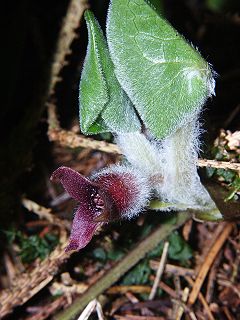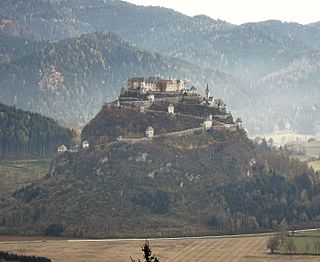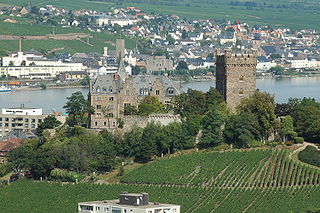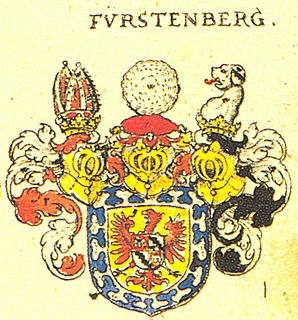
Loecknitz Castle is a castle in the municipality of Loecknitz in southeastern Mecklenburg-Western Pomerania, of which today only remnants, such as the octagonal keep are obtained. Loecknitz Castle dates back 1212. [1] [2] [3]

Loecknitz Castle is a castle in the municipality of Loecknitz in southeastern Mecklenburg-Western Pomerania, of which today only remnants, such as the octagonal keep are obtained. Loecknitz Castle dates back 1212. [1] [2] [3]

Asarum europaeum, commonly known as asarabacca, European wild ginger, hazelwort, and wild spikenard, is a species of flowering plant in the birthwort family Aristolochiaceae, native to large parts of temperate Europe, and also cultivated in gardens. It is a creeping evergreen perennial with glossy green, kidney shaped leaves and solitary dull purple flowers hidden by the leaves. Though its roots have a ginger aroma, it is not closely related to the true culinary ginger Zingiber officinale, which originates in tropical Asian rainforests. It is sometimes harvested for use as a spice or a flavoring. In former days, it was used in snuff and also medicinally as an emetic and cathartic.

Burg Castle, located in Burg an der Wupper (Solingen), is the largest reconstructed castle in North Rhine-Westphalia, Germany and a popular tourist attraction. Its early history is closely connected to the rise of the Duchy of Berg.

The Battle of Höchst was fought between a combined Catholic League army led by Johan Tzerclaes, Count of Tilly and Gonzalo Fernández de Córdoba and a Protestant army commanded by Christian the Younger, Duke of Brunswick-Lüneburg, close to the town of Höchst, today a suburb of the city of Frankfurt am Main. The result was a one-sided Catholic League victory. The action occurred during the Thirty Years' War.

Hochosterwitz Castle is a castle in Austria, considered one of Austria's most impressive medieval castles. It is on a 172-metre (564 ft) high dolomite rock near Sankt Georgen am Längsee, east of the town of Sankt Veit an der Glan in Carinthia. The rock castle is one of the state's landmarks and a major tourist attraction.

Lenzen (Elbe) is a small town in the district of Prignitz, in Brandenburg, Germany. The town lies to the north of the Löcknitz River, not far from where the Löcknitz flows into the Elbe. It is part of the Amt Lenzen-Elbtalaue.

Löcknitz is a municipality in the Vorpommern-Greifswald district, in Mecklenburg-Vorpommern, in north-eastern Germany, located in the historic region of Pomerania, 12 km (7 mi) west of the German-Polish border and 25 km (16 mi) west of Szczecin.
Löcknitz-Penkun is an Amt in the district of Vorpommern-Greifswald, in Mecklenburg-Vorpommern, Germany. The seat of the Amt is in Löcknitz.

A hornwork is an element of the Italian bastion system of fortification. Its face is flanked with a pair of demi-bastions.

Sommeregg is a medieval castle near Seeboden in the Austrian state of Carinthia, Austria. It is situated in the foothills of the Nock Mountains at an altitude of 749 m.

Hohenwang is a ruined castle in Municipality of Langenwang, Styria, Austria. It stands on a hill at an elevation of 650 metres above sea level.

Burg Kammerstein/ Ehrenfels is a castle in the town of Kammern im Liesingtal in Styria, Austria. Burg Kammerstein is 129 metres (423 ft) above sea level.

Burg Bruck is a medieval castle in Lienz in Tyrol, Austria. Burg Bruck is 711 metres (2,333 ft) above sea level.

Carlsburg was a 17th-century fortified town in Swedish Bremen-Verden at the confluence of the Weser and Geeste rivers, at the site of modern Bremerhaven, Germany. Planned to compete with Bremen, the settlement did not prosper.

Ansembourg Old Castle, known as the Old Castle of Ansembourg, in central Luxembourg is one of the castles belonging to the Valley of the Seven Castles. Located high above the little village of Ansembourg, the medieval castle is the private residence of the current Count and Countess of Ansembourg.

Klopp Castle is a castle in the town of Bingen am Rhein in the Upper Middle Rhine Valley in Rhineland-Palatinate, Germany. In the nineteenth century, the bergfried from the original medieval fortified castle was restored and a new building added which houses the town's administration.

Egon VIII of Fürstenberg-Heiligenberg was Imperial Count of Fürstenberg-Heiligenberg (1618–1635) and Bavarian Field-marshal, and an important military leader in the Thirty Years' War.

The Bremen-Verden Campaign was a conflict during the Northern Wars in Europe. From 15 September 1675 to 13 August 1676 an anti-Swedish coalition comprising Brandenburg-Prussia, the neighbouring imperial princedoms of Lüneburg and Münster, and the Kingdom of Denmark, conquered the Duchies of Bremen and Verden.
The Swedish invasion of Brandenburg (1674–75) involved the occupation of the undefended Margraviate of Brandenburg by a Swedish army launched from Swedish Pomerania during the period 26 December 1674 to the end of June 1675. The Swedish invasion sparked the Swedish-Brandenburg War that, following further declarations of war by European powers allied with Brandenburg, expanded into a North European conflict that did not end until 1679.

Brüggen Castle is a water castle in the southeastern part of the Lower Rhine municipality of Brüggen in North Rhine-Westphalia. It was the most important castle in the north of the Duchy of Jülich.